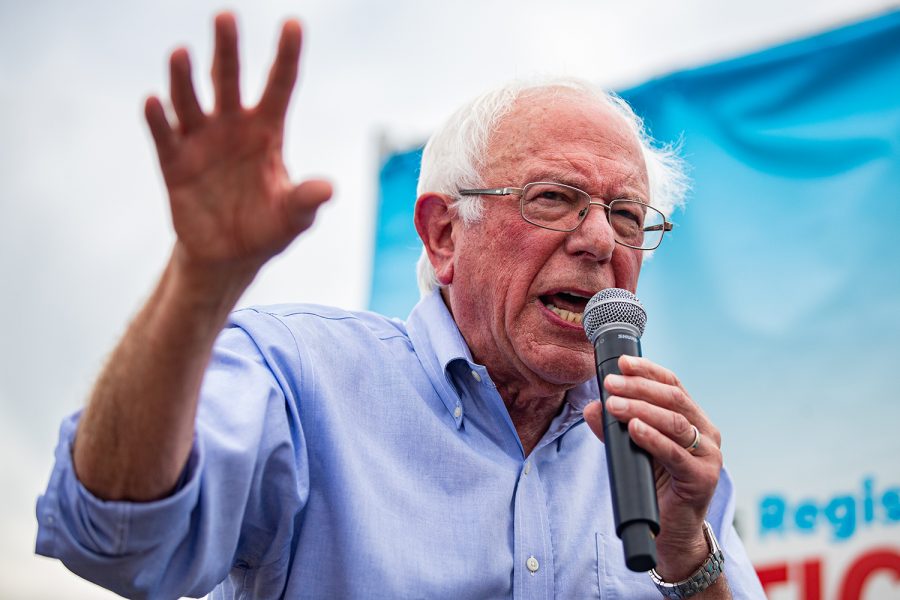Opinion: 20 Out of 20: Checking up on Bernie Sanders
The Vermont senator has taken a medical leave from the campaign trail, where he was already falling behind. Where does the 2016 Democratic runner-up go from here?
Sen. Bernie Sanders, I-VT, speaks at the Des Moines Register Political Soapbox during the Iowa State Fair in Des Moines, IA on Sunday, August 11, 2019.
October 4, 2019
There’s too much news right now. There’s Brexit in London, impeachment proceedings in Washington, and protests in Iowa City. It is possible to have missed developments in the Democratic presidential nomination — but there’s news there, too.
Sen. Bernie Sanders, I-Vt., was hospitalized Tuesday in Las Vegas after experiencing chest pains. He had artery blockage, received two stints, and is currently in recovery. According to a statement from his wife, Jane Sanders, the senator is “up and about” and expected to be discharged and return home “before the end of the weekend.”
As Sanders recovers, let’s check up on his campaign for the White House.
What happened?
Sanders’ health incident comes at time of urgency for his capital-r Revolution campaign. The democratic socialist has been sliding in the polls. Sanders is far from the solid second place he occupied in the spring, and much farther from where he was as the close runner-up in the 2016 Democratic primary.
This is all before Sanders started unequivocally showing his age (like the White Stripes said). Personally, I would have guessed senior citizenship would be a bigger obstacle for Joe Biden. The 76-year-old former vice president is known for his antiquated verbal gaffes and embrace of the political norms of yesteryear. Until now, the 78-year-old Sanders has seemed mentally sharp and focused on the future. However, none of that matters if a candidate can’t physically endure the slog of the campaign trail, let alone the presidency.
The Sanders campaign has had more to worry about than the senator’s health. His polls are looking worse as well. According to data aggregated by RealClearPolitics, Sanders is sitting under 17 percent, more than six points below than when he was at his peak in April.
While he started as a strong second choice behind Biden, Sanders has since been overtaken by Massachusetts Sen. Elizabeth Warren, who is arguably co-front-runners with Biden now. Some of the more progressive members of the Democratic Party — many of whom backed Sanders in 2016 — have lined up behind Warren. Others in his 2016 coalition — who were more anti-Hillary Clinton than pro-Sanders — have moved on to Biden or other more moderate candidates.
What is happening?
So, Sanders has lost the broad appeal he once had, and it will be more and more difficult for him to regain that support moving forward. What’s his game plan?
Whatever the strategy is, it will have to wait for a while. Sanders has canceled his upcoming events and appearances indefinitely, including a Saturday event in Iowa City. His time away from the trail probably isn’t catastrophic, but it definitely doesn’t help.
Before his health episode, Sanders raised an impressive $25 million in the past quarter, a chunk of which was planned to pay for a major statewide ad buy in Iowa. The campaign said it would postpone the ads after the senator’s hospitalization. It makes sense to hold off ,because one of the main goals of early-state ads is to generate excitement for the candidate, but it’s still not great to put everything on pause.
At least for the current moment, things don’t look good for Sanders’ second go at the Democratic nomination.
What will happen?
He has largely retained the platform he’s championed since the last century. Wealth inequality, corporate political influence, and universal health care are Sanders’ bread and butter, and he seems disinterested in diversifying his palette.
Warren, the other major progressive in the primary race, has taken up a position on just about everything. Having “a plan for that” has become a campaign trademark for her. She’s able to speak to a larger base of voters. Whatever your issue — the environment, education, employment — she has you covered.
In an attempt to not to be outflanked by the socialist to her left, Warren also has adopted the Sanders position on Medicare for All, and come out with plans to drastically increase taxes on the rich and decrease private influence in government.
Assuming Sanders stays in the race in the long term, he will most likely continue losing supporters, primarily to Warren. Sure, there is a certain number of the Sanders faithful that want him and only him, but a single-digit, factional campaign isn’t enough to win the nomination, and it’s certainly not enough to win the White House.
Columns reflect the opinions of the authors and are not necessarily those of the Editorial Board, The Daily Iowan, or other organizations in which the author may be involved.





